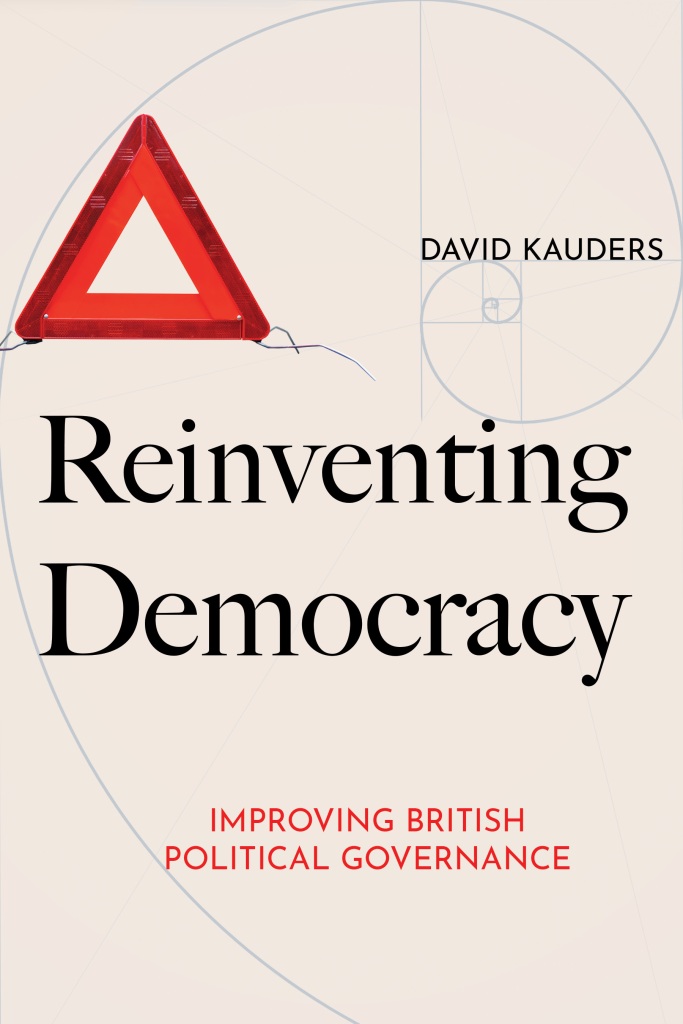
Ninety per cent of electors want political reform. But how to escape the mess? Britain should adopt a federal structure with a written constitution and an elected apolitical People’s Council replacing autocratic and ineffective bodies.
Reinventing Democracy grew out of a series of private meetings involving the author, a respected investment manager, notably one that exposed the hidden costs of the Private Finance Initiative in 2002, an examination of federalism in 2015, and an investigation into Brexit paralysis in 2017.
Growing concern about the relative economic deterioration of the United Kingdom led David to the realisation that the system of political governance is probably an unrecognised cause of British decline. Events over the last few years have provided a fertile supply of examples. All that was needed was some original thought, but nobody seemed to be facing facts. Hence the book.
At the centre of these ideas lie four major concepts:
- The People’s Council to replace the Privy Council, House of Lords, and some scrutiny functions of the present House of Commons.
- A federal structure, with sovereignty defined as sovereignty of the people of each nation instead of the Crown in parliament.
- Representation in United Kingdom-wide bodies to be determined according to the Fibonacci series, so that England can be outvoted by Scotland, Wales and Northern Ireland combined, thereby preventing England treating the other nations as colonies.
- The book includes a draft written constitution, with the aim of putting citizens in control of government.
There is much more waiting for you to discover.
My Review
Thanks to Palamedes for this tour and for my copy of this book.
The authors identifies problems with the UKs current political system and proposes solutions. His main proposal is a written constitution protecting the rights of citizens, a federal structure for the country, each of the four nations being sovereign, and abolishing the House of Lords, replacing it with a People’s Council, as oversight for the UK government. He proposes introducing a referenda system similar to that in Switzerland, where referenda can take place at local, regional, national and UK levels. Kauders believes a federal system will bring more people into the political process, making it more democratic. He also highlights the deplorable way privatisation and PFI has cost the country massive amounts of money that has gone to private companies and individuals at the expense of infrastructure and essential services.
David Kauders has a background in financial management, so I’m inclined to trust his opinions on the financial mess the UK is in, and he’s lived in other countries, and currently lives in Switzerland, so I’m inclined to respect his insight into current capitalist political systems. I agree with most of what he proposes in this book, although I would change some of the language to be more inclusive, and would renationalise (and nationalise newer) essential services, such as water, energy, healthcare, education, transport, infrastructure and the internet. I’d fine the hell out of the private companies currently holding the monopolies for the lack of investment in infrastructure. It would be punitive, too, because they’re causing suffering. Landlords wouldn’t get off so easily either, and I’d find a way to break the control of landed interests. And I’d abolish the monarchy. As, I’ve mentioned before, I’m a socialist by philosophy, and don’t like hierarchy or vertical structures. If there’s to be any form of hierarchy, because someone needs to lead on some projects, then the power should be in the base of the triangle, and anyone can be recalled if they’re terrible at their job.
I know, it’s a but much all in one go. Kauders’ less drastic proposals are spread over a period of 15 to 20 years, giving people time to understand and digest proposals, then vote, and eventually, once ratified, implement. He also proposes ways to ensure honest reporting and information about the evidence for and reasoning behind an y proposed legislation or action. The complete and utter ball’s up that is Brexit has shown clearly that lies convinced people to agree to a hard Brexit, even though they were not told that’s what it would be, and that much of the promised largesse from leaving the EU will never come to pass.
Lies and bad reasoning have no place in democracy. Unclear referendum questions that can be manipulated by bad actors (Tories) have no place in a democracy. Two-party adversarial politics has no place in a democracy. Power centred in one corner of one of four nations has no place in a democracy.
So, given my philosophical leanings, and the way we’ve been screwed over by Westminster for the last 400 years with a compromised and unwritten constitution, I’d say the proposals in this book are definitely worth looking at and considering. It has to be better than what we’ve got now.
P.S. If you love a disabled person, don’t vote Tory!
About the author
Author David Kauders is a respected investment manager and noted ‘radical thinker’.
He is credited with predicting the 2007-8 mortgage-related credit crunch and his other books include The Greatest Crash: Avoiding The Financial System Limit and Understanding Brexit Options: What Future for Britain?
Based in Switzerland, his writing benefits from the vantage point of a British expatriate in a European democracy.
David Kauders FRSA was educated at Latymer Upper School, Jesus College Cambridge and Cranfield School of Management. He is an investment manager and author.
By the same author
The Greatest Crash: Avoiding the financial system limit (revised edition 2024)
Understanding Brexit Options: What future for Britain?
The Financial System Limit: The world’s real debt burden (UK edition, hard cover, subtitle: Britain’s real debt burden, includes UK postscript)
Bear Markets: When finance turns upside down (forthcoming)


